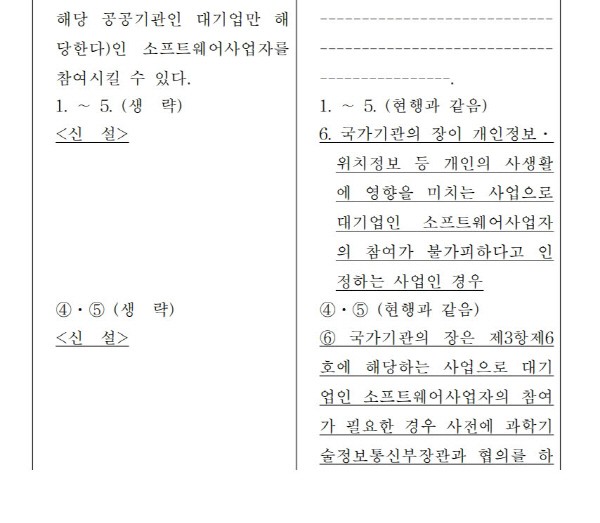
The mid-sized IT service industry strongly objected to the revision of the SW Promotion Act, which would grant each ministry beyond the existing Ministry of Science and ICTthe authority to recognize the participation of large corporations in public software (SW) projects. They argue that the revision will in effect nullify the system that restricts participation of large corporation, although the revisionis put forward to reflect the ministries’characteristics and provide responsible administrative service.
According to the industry on June21st, controversy is spreading over the 'Partial Revision of the SW Promotion Act' proposed by Democratic Party lawmaker Jun-ho Han last month.
The amendment adds subparagraph 6 to Article 48 (3) of the SW Promotion Act, which lists the areas of exception to the restrictions on large corporations’ participation, specifying 'In cases where the head of a national agency recognizes that participation by a large corporation is inevitable as the project affects privacy, such as personal information and location information'. At the same time, Article 48 newly added clause 6, stipulating that 'The head of a national agency must consult with the Minister of Science and ICT in advance if a large corporation needs to participate in the project referred to in Item 6'.
The current law requires the Minister of Science and ICT to announce exceptions to the restrictions on the participation of large companies and to form a deliberation committee to conduct review. In addition, the amendment grants the head of each national institution the authority to recognize the participation of large corporations. The proposed amendment is because the Minister of Science and ICT has the authority to decide the participation of large companies in information systems that have a huge influence on people's lives, such as education and invasion of privacy. As a result, the revision explained that administrative services are carried out smoothly as the head of the relevant national institution, who is responsible from the establishment to start of the information system, is excluded.
Jun-ho Han, an official from the parliamentary office, said, "Along with reflecting the characteristics of each ministry, we expect to see positive effects such as software quality improvement and mutual growth of SMEs following the participation of large companies in exceptional circumstances (privacy infringement). Concerns about expertise can be resolved through a prior consultation with working-level staff with technical skills or a research group.”

A review report by the Science, ICT, Future Planning, Broadcasting, and Communications Committee of the National Assembly evaluated, “It is reasonable for each central government ministry to decide the participation of large companies by reflecting the characteristics of information systems they want to operate and manage. However, it is difficult to secure enough neutrality, objectivity, and consistency compared to the method announced by the Minister of Science, which may deepen the preference for large firms.” The report judged that a significant number of information systems run by government agencies affect privacy, such as personal and location information, since the revision will be effective across the broad scope of a project.”
The Ministry of Science and ICT opposes, claiming that it is difficult to agree with having the head of each state agency directly acknowledge the participation of large corporations in terms of objectivity or fairness; deciding on large corporations’ participation only through prior consultation undermines the purpose of the system.
The Ministry of Science and ICT delivered an alternative idea by adding 'Projects prescribed by Presidential Decree for the privacy protection such as personal and location information' to the excepted areas to the restrictions of participation by large corporations including national defense and public security.
The mid-sized IT service industry strongly opposed the bill, planning to raise their voice of opposition by preparing a statement and visiting Representative Jun-ho Han’s office to protest.
An official from a mid-sized IT service company said, “It is possible that a key ministry wanting to entrust its project to a large company has requested the law amendment to the parliamentary office. If the bill passes, the participation of large companies will increase, and the restriction system will become ineffective.”
The proposal of the Ministry of Science and ICT to add personal and location information to the excepted projects from the participation restriction should not be accepted due to a fear of a sharp increase in the number of applications for exception projects, as in the past case of 'new industry'.”
On the other hand, an official from a large IT service company said, “It is difficult for the Deliberation Committee to identify the project of each ministry within a short time, but rather, each ministry can make an accurate judgment. Even if the amendment is implemented, ministries will not be randomly selecting large companies.” The amendment has been submitted to the National Assembly’s Science, ICT, Future Planning, Broadcasting, and Communications Committee and will soon be referred to the Bill Review Subcommittee. As the stakes are sharp, the process of billing is expected to face barriers.
By Staff Reporter Ho-cheon Ahn hcan@etnews.com